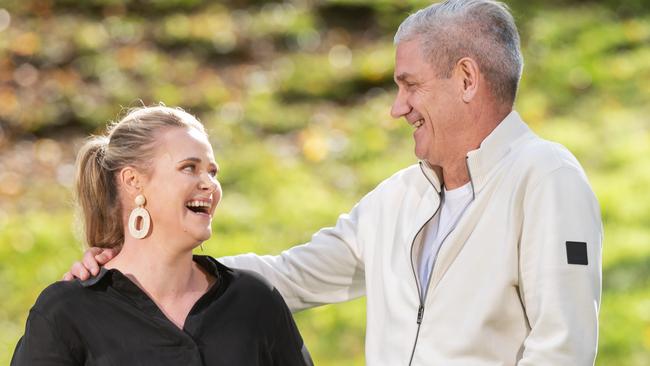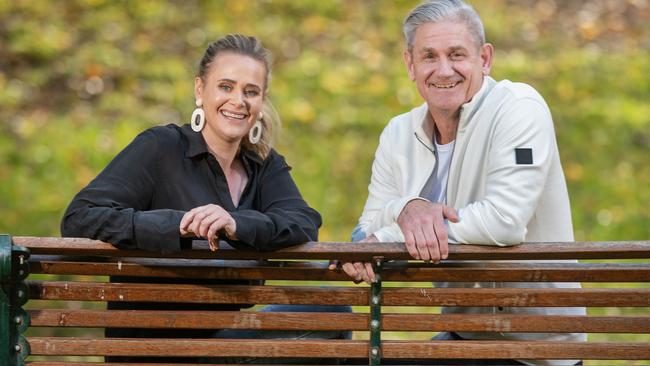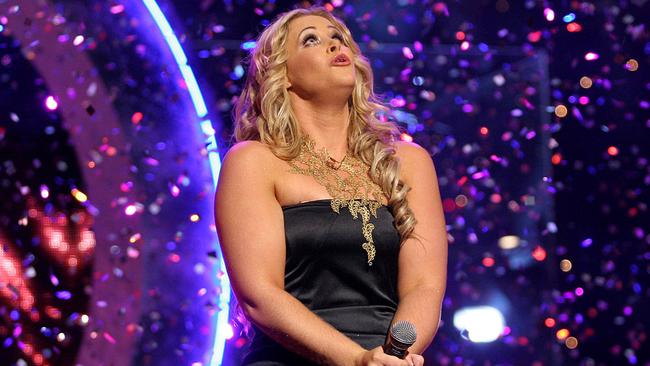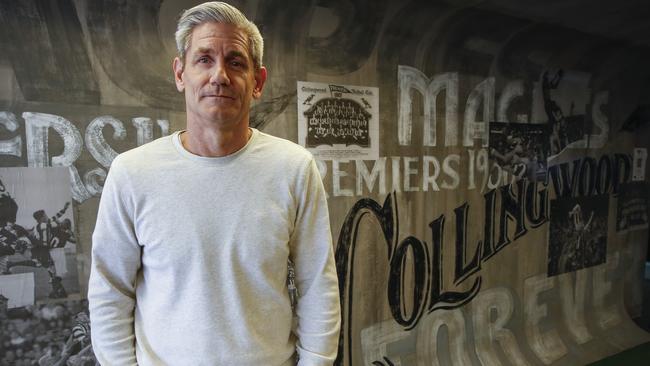Kate DeAraugo opens up on her recovery from drug addiction and how premiership Magpie Gavin Crosisca helped save her
Gavin Crosisca knows what it is like to be stuck in addiction hell. After beating his own demons, he turned his attention to helping one of the biggest names in Australian music.

AFL
Don't miss out on the headlines from AFL. Followed categories will be added to My News.
For all the fame and fortune in Australian Idol winner Kate DeAraugo’s life she could never escape the “impostor syndrome” that drove her to a life-threatening drug addiction.
Despite his AFL stardom 1990 premiership player Gavin Crosisca still lived with the shame of being a drug addict, hiding his affliction for two decades.
Crosisca’s rock bottom as an alcoholic and problem gambler who snorted speed daily was planning how to stage a robbery at a pub he co-owned to collect the $60,000 takings to fuel his habit.
So as DeAraugo finally started her own journey back from oblivion after a 2017 arrest for drug charges, Crosisca shaped as the most unlikely of saviours.
Yet on Friday Crosisca will celebrate his own significant milestone – his 12th anniversary of sobriety – while also being inextricably linked to DeAraugo’s journey of self discovery.
As she tells the Herald Sun in celebrating her own five-year milestone of clean living after the previous decade of addiction, none of it has been even remotely easy.
DeAraugo’s path involved several failed rehab attempts until she was finally able to heal her body and mind through a long-term stint at Crosisca’s Sober Living Rehab treatment centre.
DeAraugo has emerged on the other side of a harrowing, hellish period aware of how easily she could have lost her life to addiction.
Now with a “miracle” baby boy and with her music career back on track, DeAraugo tells the Herald Sun her decision to get clean came when her life finally boiled down to two simple choices.

Get clean or allow her drug addiction to kill her.
“It was pretty heavy. I suppose it was to change or potentially die, for me. I was left with not much choice. And I didn’t want to do that. I didn’t want to do that to my family. And I didn’t want to do that to myself. It was a matter of life or death for me at the end, so I had no choice but to go in and get better.”
Bendigo-raised DeAraugo, 37, enjoyed the kind of meteoric rise to fame that so many of the current generation’s influencers and pop wannabes can only dream about.
The winner of the third Australian Idol reality TV series in 2005, her first album went platinum.
Her fame only intensified when she joined Emily Williams, Ricki-Lee Coulter, and Paulini in the Young Divas group the following year.
But as she told the Herald Sun this week, that success masked insecurity that would eventually lead to a downward spiral and a decade-long experiment with drugs.
In 2017 she was arrested in possession of crystal meth, a large knife and tomahawk in Bendigo before eventually escaping conviction.
“It was quite a long and complicated road that got me there. I spent that whole time running from myself and hating myself,” she said.
“The addiction is the end result of a much greater problem. You would have thought winning a TV show and being put in the spotlight and having that success, that I would be able to believe in myself and be confident.
“But I don’t even remember a time growing up when I was sure about myself or confident in what I did.
“I have always been pretty riddled with self-doubt and that was just exacerbated by being in the spotlight.
“I live in this impostor syndrome. I spent my whole time believing that one day I would get caught and that people would know I didn’t belong.”
DeAraugo isn’t ready to go into the details of just how messy her world became in those years leading up to her very public arrest.

“But I remember looking at myself and saying, ‘Oh my god, how did I get here? How did life go from where it was to where it was now?’” she says.
By the time Crosisca entered her life, her family were desperate for her to change but she was still in denial about how far she had fallen.
“I think her family wanted it more than she did at that stage,” says Crosisca.
He says ice addiction is so pervasive only two per cent of people get to 12 months sober if they spend only four weeks at an addiction or rehab centre.
“The simple fact is the percentage of people who get well straight away is very low. When they come in they are pretty broken. When Kate came in and first had a go at it, she would be the first to admit she was a troublesome child. That made it difficult for us, but she had great family support,” he says.
Says DeAraugo: “People would think (the arrest) would be the rock bottom but it actually wasn’t the internal rock bottom for me. I think it was about 18 months after that. That was the catalyst for me to really know I had to change.
“I had a couple of false starts in recovery. I did an inpatient treatment for six weeks and it was recommended that it wouldn’t be enough and that’s when I first went to Sober Living Rehab.
“I went there for a short period of time and I wasn’t actually ready to listen and I was still running my own race. I went back out for a little while and that’s when the moment hit and I knew it was time to change. I actually contacted Gavin and (business partner Belinda Walsh) and said, ‘I need help. I need help now’.

“And so I started the long, long road of getting clean and doing the work.”
Crosisca says the Sober Living Rehab program prioritises family support and care given their critical role once a patient leaves the facility.
He remains adamant his own wife Nicole’s unyielding support was the single factor that got him clean and kept him that way.
DeAraugo first got clean, then began the process of therapy that answered her own questions about why she used drugs and how she got to that point.
“It was all that internal stuff and self-doubt and self-hatred and the fear that I lived on that I needed to work on,” she says.
“Sober Living Rehab gave me a safe place to really look at all my parts while being supported to do so. To let all my walls down and get messy and be held through it.”
It also allowed her to repair a broken relationship with a family that was despairing that it had effectively lost a daughter.
“Sober Living didn’t just heal me, it saved my life,” she said.
“But one of the most important parts to me is that it was a family program and it helped reunite and heal my family. And that meant the world to me.
“By the time I ended up in Sober Living I’d pretty much lost them. I had certainly severed our relationships pretty badly. And I sit here today with them all back in my life. And I have healed and they have healed.”
Crosisca, 54 and a veteran of 246 AFL games, has added work in welfare with Collingwood’s Past Players network to his portfolio.
He is helping build connections in that group and trying to lift up those who might have fallen through the cracks.
He is in touch with 420 of the 525 past players as the Pies make their past players an increasing focus under the current administration and past players president Paul Tuddenham, recently elected to the board.

Crosisca’s work in addiction care has helped him stay clean but he still has strategies to cope and a rock-solid supporter in wife Nicole.
“I am not tempted at all (by drugs) and I don’t think even early in recovery I was tempted,” he said.
“But when everyone is drinking and having a good time there can be some ‘FOMO’. I always have an exit plan even now, if I get somewhere and I am a bit antsy and not feeling it. The main thing for me in the early days was the gambling component.
“I was a gambler and even now when I see a gaming venue with the bright lights the memory comes back. It would be a miserable day, but I would have seen it as a good day drinking and gambling and carrying on.
“Addiction tells you that you don’t have anything wrong with you and it’s why it can be really hard when you are not supported in the right environment. If Nicole hadn’t set really firm boundaries for me coming back home I wouldn’t be where I am now.”
DeAraugo is ready to tour again in the second half of the year and about to launch a podcast detailing her story in forensic detail.
She says by the time she was ready to get clean Crosisca’s own story resonated with her.
But it was less to do with his public profile than his unrelenting support.
“I was there for a long time. So we had many chats over the time and we were able to relate on another level again. But it wasn’t about the fame, it was about two people being able to understand the feelings that got us to this place we ended up in,” she said.
“That was the greatest support and the greatest comfort. It didn’t matter how famous or important he was and it didn’t matter how famous or important I was. He understood how I felt. Despite all the noise and the fame, being able to relate to someone in the darkest times is the most important thing.”





